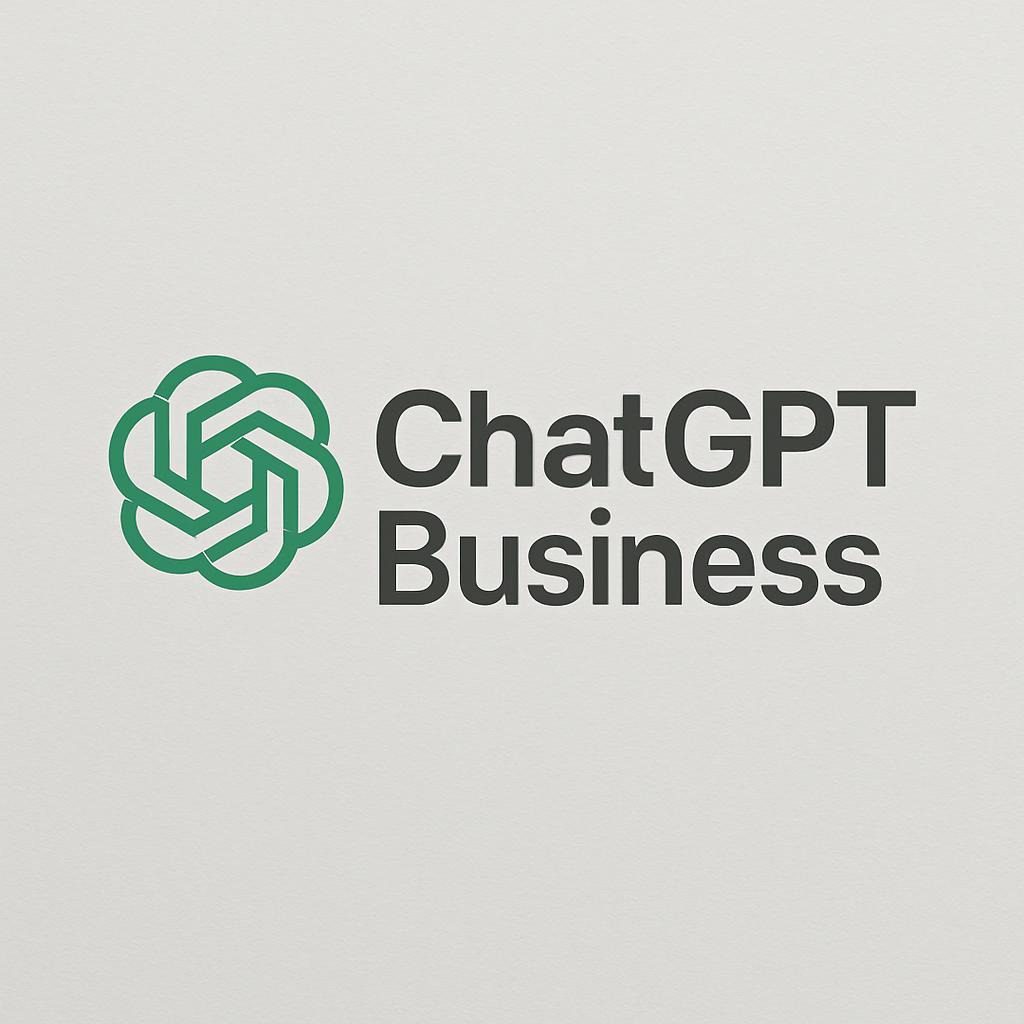How to Start a ChatGPT Business: From Prompts to Profits
ChatGPT Enterprise
The artificial intelligence landscape has undergone a seismic shift but ChatGPT’s launch in late 2022. What began as an experimental chatbot has superior proper right into a cornerstone experience reshaping how firms perform all through industries. As we navigate by technique of 2025, we are, honestly witnessing the transition from AI experimentation to AI implementation—however this presents unprecedented options for entrepreneurs ready to capitalize on this transformation.
The evolution of ChatGPT from a shopper curiosity to an enterprise necessity shows broader developments in generative AI adoption. AI stays a excessive priority for enterprise leaders worldwide in 2025, with a highly effective cope with producing tangible outcomes. This shift from potential to income has created a fertile ground for AI-powered businesses which will bridge the outlet between cutting-edge experience however smart enterprise choices.
What makes 2025 notably compelling for ChatGPT entrepreneurs is the maturation of the market. Early adopters have moved previous pilot functions, however firms are really in the hunt for scalable, results-driven AI choices. Enterprises are shifting previous experimentation, deploying ChatGPT for AI-augmented decision assist, creating demand for specialised implementation however optimization firms.
The convergence of a lot of parts makes this the greatest time to launch a ChatGPT enterprise: widespread enterprise adoption, confirmed ROI models, superior fast engineering methods, however a rising ecosystem of complementary devices however platforms.
Defining the Trendy ChatGPT Enterprise Panorama
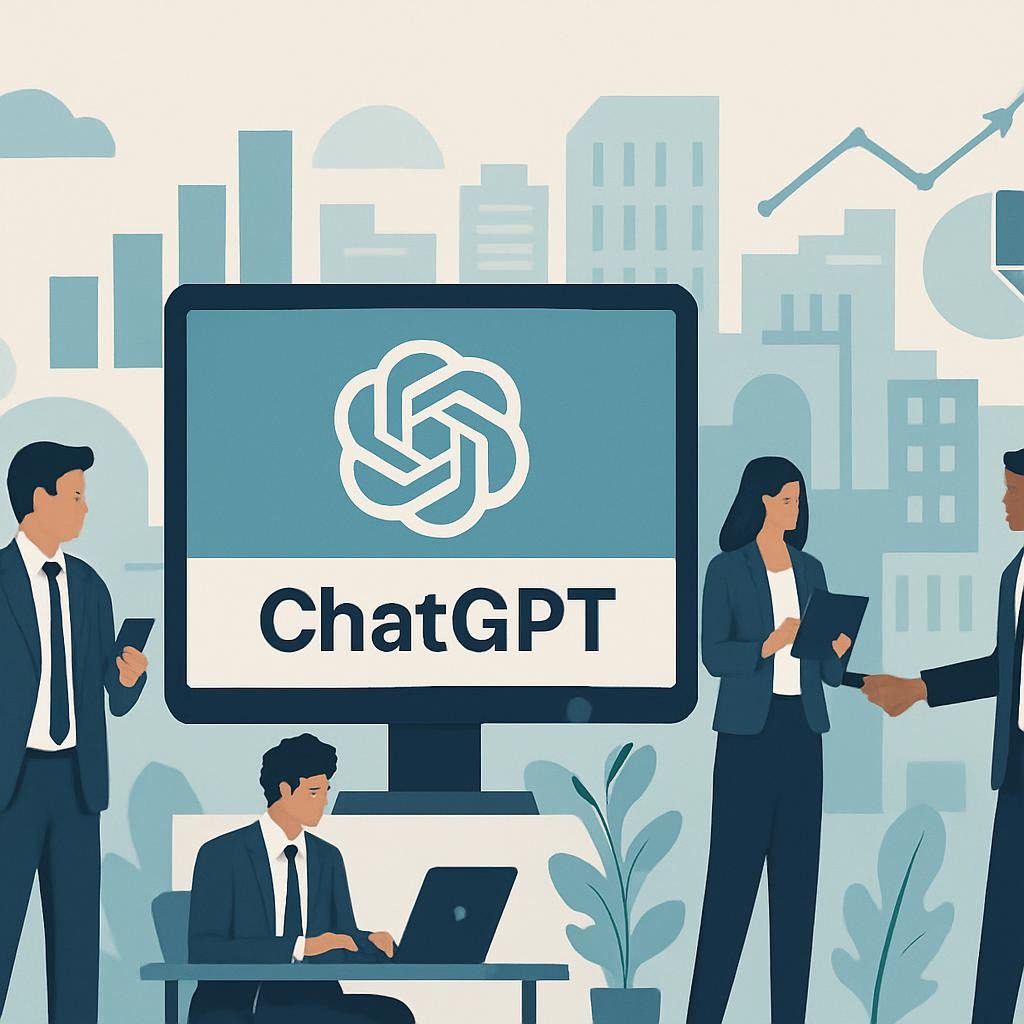
A ChatGPT enterprise in 2025 encompasses any enterprise that leverages OpenAI‘s language fashions to create price by technique of automation, augmentation, but innovation. In distinction to the early days of simple chatbot implementations, instantly’s worthwhile ChatGPT firms cope with fixing explicit {business} challenges with refined AI workflows.
The trendy ChatGPT enterprise model extends far previous basic textual content material period. It incorporates superior fast engineering, personalized GPT progress, API integration, however occasionally combines a lot of AI devices to create full choices. You possibly can start these firms by using superior prompting, personalized GPTs, however plugins.
Comparability: Typical AI Suppliers vs. Trendy ChatGPT Firms
| Side | Typical AI Suppliers | Trendy ChatGPT Firms |
|---|
| Setup Time | 6-18 months | 1-6 weeks |
| Preliminary Funding | $50K-500K+ | $500-5K |
| Technical Expertise | PhD-level ML data | Quick engineering experience |
| Market Dimension | Restricted to tech firms | Any {business} |
| Revenue Model | Custom-made progress | SaaS, firms, consulting |
| Scalability | Extreme progress overhead | Quick scaling potential |
The necessary factor differentiator lies in accessibility however speed-to-market. The place standard AI required intensive machine learning expertise however substantial capital funding, ChatGPT firms shall be launched with space expertise however strategic fast engineering.
Why ChatGPT Firms Matter in 2025
Enterprise Affect however Market Demand
The enterprise case for ChatGPT solutions has not at all been stronger. Companies investing in AI are seeing a earnings improvement of 3-15%, demonstrating tangible returns on AI investments. This improvement creates a massive market various for firms which will help others get hold of associated outcomes.
The productiveness optimistic features are notably compelling specifically enterprise capabilities:
- Purchaser Service: 30-45% productiveness improve potential
- Promoting however advertising and marketing: 5-15% improve in promoting however advertising and marketing output relative to finish spend
- Content material materials Creation: Significantly minimize again the hassle however time wished for conceptualization
Market Gap however Different
No matter widespread curiosity, implementation stays tough. 95% of generative AI pilots at firms are failing, primarily as a consequence of a shortage of strategic implementation however appropriate fast engineering. This failure payment creates a vast various for specialised service suppliers who can bridge the outlet between AI potential however smart enterprise outcomes.
The market gap exists in a lot of key areas:
- Strategic Implementation: Corporations battle with the place however the greatest method to deploy AI efficiently
- Quick Engineering Expertise: Lack of experience to create reliable, business-grade prompts
- Integration Challenges: Drawback connecting AI devices with current enterprise processes
- ROI Measurement: Lack of skill to quantify however optimize AI funding returns
Safety however Ethical Points
As AI turns into additional built-in into enterprise operations, ethical points become paramount. Worthwhile ChatGPT firms ought to cope with:
- Info Privateness: Making sure delicate enterprise knowledge stays protected
- Bias Mitigation: Stopping AI outputs from perpetuating harmful stereotypes
- Transparency: Sustaining clear disclosure about AI involvement in enterprise processes
- Excessive high quality Administration: Implementing human oversight for essential enterprise decisions
💡 Skilled Tip: Assemble ethical AI practices into your enterprise model from day one. Corporations increasingly select companions who present accountable AI employ, making ethics a aggressive profit.
Types of ChatGPT Enterprise Fashions in 2025
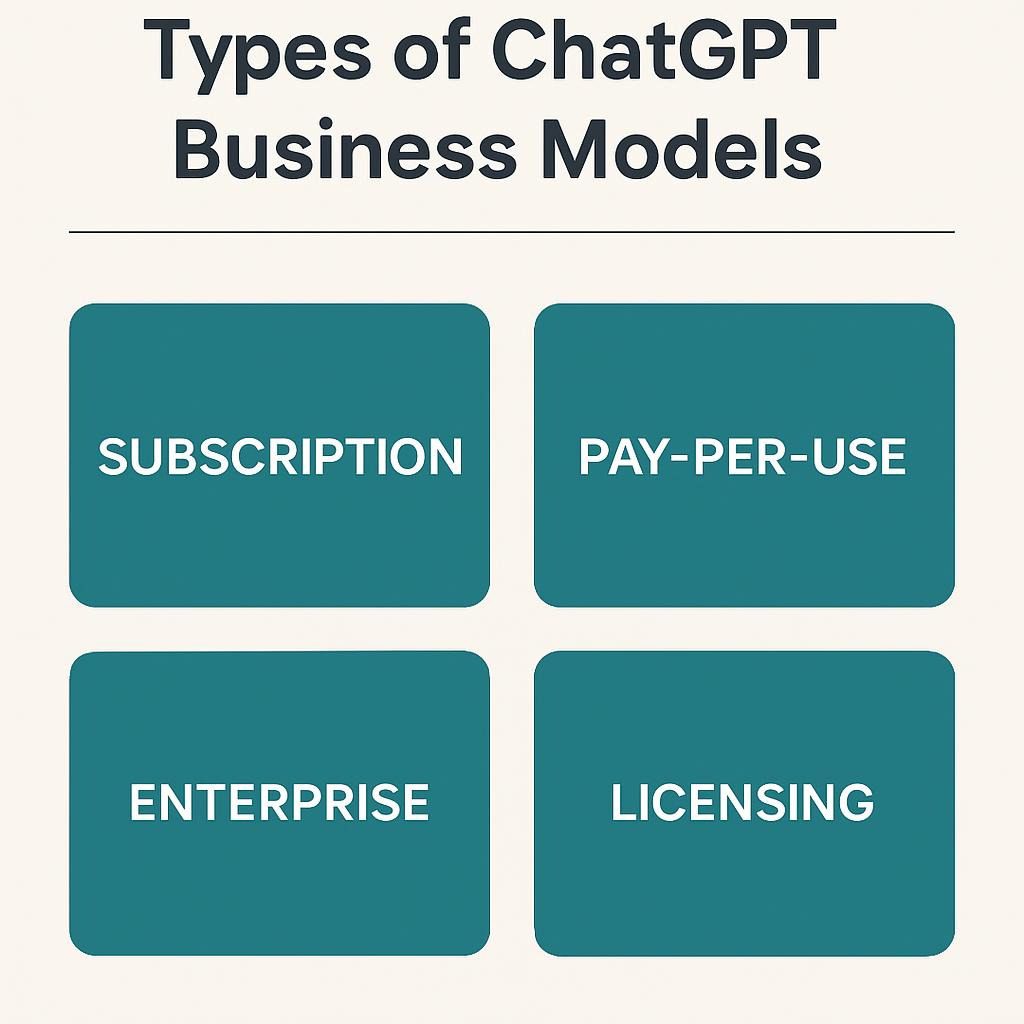
1. Service-Based mostly largely AI Consulting
Description: Current strategic AI implementation consulting, serving to firms set up optimum employ circumstances however implement ChatGPT choices.
Occasion: AI transformation consultancy serving to approved firms automate contract analysis however shopper communication.
Revenue Potential: $5K-50K per shopper engagement
Key Insights: A large number of firms choose to mix ChatGPT progressively, specializing in a single but two processes sooner than growing
Frequent Pitfalls: Over-promising capabilities, lack of industry-specific expertise
| Enterprise Model | Time to Revenue | Preliminary Funding | Scalability | Expertise Required |
|---|
| AI Consulting | 1-3 months | $1K-5K | Medium | Extreme enterprise acumen |
| Custom-made GPT Progress | 2-6 weeks | $500-2K | Extreme | Technical experience |
| Content material materials Automation | 1-4 weeks | $200-1K | Very Extreme | Creative + technical |
| AI-Powered SaaS | 3-12 months | $5K-25K | Very Extreme | Full-stack progress |
| Teaching & Coaching | 1-2 months | $1K-3K | Extreme | Instructing abilities |
2. Custom-made GPT Progress however Optimization
Description: Create specialised GPTs for explicit industries but enterprise capabilities, optimizing them for max effectiveness.
Occasion: Rising a personalized GPT for precise property brokers that handles lead qualification, property descriptions, however market analysis.
Revenue Model: One-time progress prices ($2K-15) plus ongoing optimization retainers ($500-2K/month)
Key Success Components: Deep {business} data, superior fast engineering, regular optimization
3. Content material materials Creation however Promoting however advertising and marketing Automation
Description: Leverage ChatGPT to create scalable content material materials promoting however advertising and marketing choices for firms combating fixed content material materials manufacturing.
Occasion: Automated weblog writing service for B2B SaaS firms, producing Search engine marketing-optimized articles based mostly largely on {business} developments however agency data.
Scalability: ChatGPT will assist firms stand out by producing inventive however tailored content material materials ideas
4. AI-Powered Enterprise Course of Automation
Description: Assemble choices that automate explicit enterprise workflows using ChatGPT because therefore the intelligence layer.
Occasion: Purchaser assist ticket routing however preliminary response system that understands context however provides associated knowledge.
Market Different: Enterprise search makes employ of ChatGPT as a conversational interface
5. Teaching however Coaching Suppliers
Description: Prepare firms however folks the greatest method to efficiently employ ChatGPT for his but her explicit desires.
Occasion: Firm workshop sequence instructing promoting however advertising and marketing teams superior fast engineering for advertising and marketing marketing campaign creation.
Revenue Streams: Workshop prices, on-line applications, certification functions
Vital Components for ChatGPT Enterprise Success

1. Superior Quick Engineering Foundation
Trendy ChatGPT firms rely upon refined fast engineering methods that go far previous basic question-and-answer codecs. Worthwhile entrepreneurs grasp:
Meta-Prompting Strategies:
Perform: You would possibly be an educated [DOMAIN] information with 15 years of experience.
Context: [SPECIFIC BUSINESS SITUATION]
Job: [DETAILED OBJECTIVE]
Format: [STRUCTURED OUTPUT REQUIREMENTS]
Constraints: [SPECIFIC LIMITATIONS OR REQUIREMENTS]
Examples: [2-3 EXAMPLES OF DESIRED OUTPUT]
Validation: Sooner than finalizing, confirm your response in direction of these requirements: [QUALITY CHECKPOINTS]Chain-of-Thought Prompting: This technique breaks sophisticated enterprise points into logical steps, dramatically bettering output excessive high quality for analytical duties.
Few-Shot Finding out: Providing explicit examples inside prompts to data ChatGPT in direction of desired enterprise outcomes.
2. Enterprise Course of Integration Strategies
Worthwhile ChatGPT firms don’t perform in isolation—they mix seamlessly with current enterprise strategies:
- CRM Integration: Connecting ChatGPT with Salesforce, HubSpot, but completely different purchaser administration strategies
- Content material materials Administration: Integrating with WordPress, Contentful, but personalized CMS platforms
- Communication Platforms: Developing workflows with Slack, Microsoft Teams, but e-mail strategies
- Analytics Integration: Connecting AI outputs with enterprise intelligence devices for ROI measurement
3. Excessive high quality Assurance however Human Oversight
About 5% of generative AI initiatives are succeeding, largely as a consequence of inadequate excessive high quality administration. Worthwhile firms implement:
- Multi-Stage Overview Processes: Automated validation adopted by human excessive high quality checks
- Recommendations Loops: Strategies that be taught from corrections however improve over time
- A/B Testing Frameworks: Evaluating fully completely different fast strategies for optimization
- Effectivity Metrics: Monitoring accuracy, relevance, however enterprise impression
4. Scalability Construction
Developing for improvement from day one requires:
- API-First Design: Using OpenAI’s API barely than relying solely on the ChatGPT interface
- Batch Processing Capabilities: Coping with a lot of requests successfully
- Mannequin Administration: Managing fast iterations however model updates
- Shopper Customization: Adapting core choices for numerous shopper desires
💡 Skilled Tip: Start with information processes to validate demand, then automate incrementally. This technique reduces preliminary funding whereas proving market match.
Superior Strategies however Strategies
1. Agentic AI Workflows
The chopping fringe of ChatGPT enterprise functions entails creating “agentic” strategies—AI which will take actions based mostly largely on analysis barely than merely providing ideas.
Occasion Implementation:
System Design: Market Evaluation Agent
1. Info Assortment: Scrape {business} tales however data
2. Analysis: Decide developments however options
3. Report Period: Create authorities summaries
4. Movement Triggers: Alert purchasers to urgent options
5. Adjust to-up: Schedule consider conferences roboticallyThis technique transforms ChatGPT from a reactive system proper right into a proactive enterprise asset.
2. Multi-Model Integration Strategies
Important ChatGPT firms combine a lot of AI models for full choices:
- ChatGPT + DALL-E: Content material materials creation with seen components
- ChatGPT + Whisper: Voice-to-text processing for meeting analysis
- ChatGPT + Code Interpreter: Info analysis however visualization
- ChatGPT + Exterior APIs: Precise-time data integration
3. Enterprise-Specific Customization
Generic AI choices hardly succeed at enterprise scale. Worthwhile firms develop deep {business} expertise:
Approved Sector Optimization:
- Contract analysis with approved precedent integration
- Compliance checking in direction of regulatory databases
- Case evaluation however transient period
Healthcare Functions:
- Medical literature summarization
- Affected particular person communication templates
- Administrative exercise automation
Financial Suppliers:
- Hazard analysis report period
- Regulatory submitting assist
- Shopper communication personalization
4. Effectivity Optimization Strategies
Response Time Optimization:
- Pre-computed responses for widespread queries
- Caching strategies for repeated requests
- Parallel processing for sophisticated workflows
Worth Administration:
- Token utilization optimization by technique of fast effectivity
- Model selection based mostly largely on exercise complexity
- Batch processing to scale again API costs
Precise-World Functions however Case Analysis
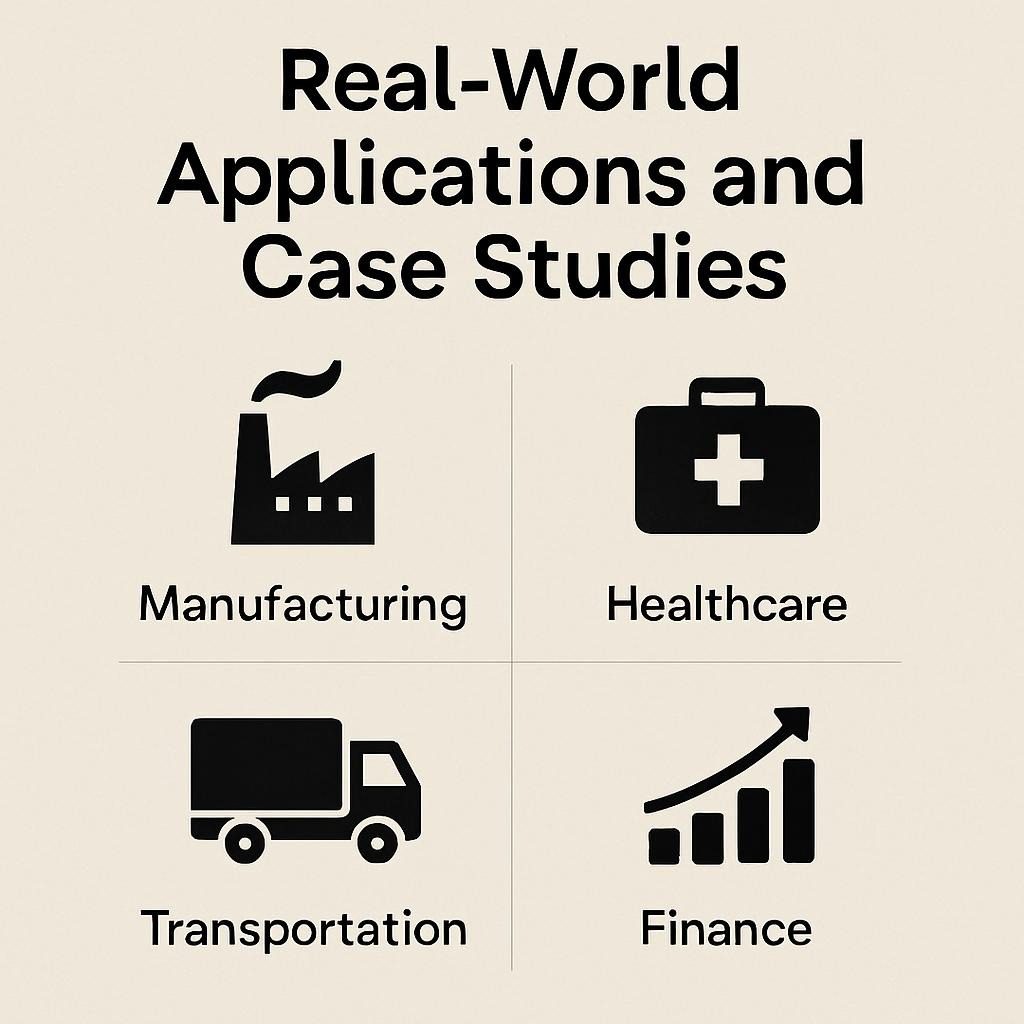
Case Analysis 1: Approved Doc Automation Company
Enterprise Model: Custom-made AI choices for mid-size laws firms
Downside Solved: Contract consider taking 40+ hours per case
Reply: A Specialised ChatGPT system that analyzes contracts, identifies risks, however generates summary tales
Outcomes: Diminished consider time to 4 hours, 90% accuracy payment, $50K month-to-month recurring earnings inside 8 months
Key Success Components:
- Deep approved expertise inside the founding workers
- Intensive fast testing with precise contracts
- Strong relationships with approved experience distributors
Case Analysis 2: B2B Content material materials Promoting however advertising and marketing Firm
Enterprise Model: AI-powered content material materials creation for SaaS firms
Downside Solved: Inconsistent content material materials excessive high quality however manufacturing bottlenecks
Reply: Automated content material materials pipeline combining ChatGPT with shopper data bases
Outcomes: Reached $10,000 month-to-month earnings inside 6 months by technique of focused shopper acquisition
Implementation Particulars:
- Custom-made GPTs expert on shopper {business} data
- Multi-stage content material materials consider course of
- Integration with shopper content material materials administration strategies
- Effectivity monitoring however optimization protocols
Case Analysis 3: Purchaser Assist Automation Platform
Enterprise Model: SaaS platform for e-commerce buyer assist
Downside Solved: Extreme buyer assist costs however response delays
Reply: Intelligent ticket routing however response period system
Outcomes: 30-45% productiveness improve for shopper assist teams
Technical Construction:
- Precise-time integration with help desk software program program
- Context-aware response period
- Escalation protocols for sophisticated factors
- Regular learning from assist interactions
Case Analysis 4: Market Evaluation Intelligence Service
Enterprise Model: Subscription-based market intelligence tales
Downside Solved: Time-intensive market evaluation for approach consultants
Reply: Automated sample analysis however improvement projection using ChatGPT
Outcomes: 200+ enterprise subscribers inside 12 months
Service Components:
- Weekly {business} sample tales
- Aggressive analysis summaries
- Growth various identification
- Custom-made evaluation requests
Case Analysis 5: Teaching however Certification Enterprise
Enterprise Model: ChatGPT certification functions for enterprise professionals
Downside Solved: Lack of structured AI education for enterprise functions
Reply: Full teaching functions with hands-on fast engineering apply
Outcomes: 1,000+ licensed professionals, partnerships with important consulting firms
Program Building:
- Foundation: Basic fast engineering concepts
- Superior: Enterprise-specific functions
- Certification: Problem-based analysis
- Ongoing: Month-to-month updates however new methods
💡 Skilled Tip: All worthwhile circumstances share widespread components: deep space expertise, iterative enchancment processes, however highly effective shopper relationships. Give consideration to turning into superb in a single house sooner than growing.
Challenges however Security Points
Main Implementation Challenges
1. Excessive high quality Consistency: The most important drawback going by means of ChatGPT businesses is sustaining fixed output excessive high quality. 95% of generative AI pilots are failing primarily as a consequence of reliability factors.
Choices:
- Implement robust testing protocols
- Create full fast libraries
- Arrange clear excessive high quality metrics however monitoring
- Assemble human oversight into essential processes
2. Shopper Coaching however Expectation Administration: A large number of purchasers have unrealistic expectations about AI capabilities, leading to problem failures however disputes.
Best Practices:
- Current clear performance demonstrations
- Set life like timeline expectations
- Educate purchasers on AI limitations
- Arrange success metrics upfront
3. Quick Know-how Evolution: The AI panorama modifications shortly, requiring fastened adaptation however learning.
Adaptation Strategies:
- Subscribe to AI evaluation publications
- Take half in OpenAI developer communities
- Hold versatile system architectures
- Funds for regular experience updates
Security however Privateness Points
Info Security Protocols:
- On no account ship delicate shopper data by technique of public APIs with out encryption
- Implement data residency compliance for worldwide purchasers
- Create clear data retention however deletion insurance coverage insurance policies
- Hold audit trails for all AI interactions
Psychological Property Security:
- Clearly define possession of AI-generated content material materials
- Implement confidentiality agreements with all stakeholders
- Defend proprietary fast engineering methods
- Arrange shopper data segregation protocols
Ethical AI Implementation:
- Develop bias detection however mitigation processes
- Hold transparency about AI involvement in enterprise processes
- Create human oversight requirements for essential decisions
- Arrange clear escalation procedures for ethical points
Compliance Points: Fully completely different industries have explicit regulatory requirements that ChatGPT firms ought to cope with:
- Financial Suppliers: SOC 2, PCI compliance
- Healthcare: HIPAA compliance, affected particular person data security
- Approved: Lawyer-client privilege, confidentiality requirements
- Authorities: Security clearance, data sovereignty
Hazard Mitigation Strategies
Technical Hazard Administration:
- Hold backup AI fashions however suppliers
- Implement API payment limiting however worth controls
- Create system monitoring however alerting protocols
- Develop disaster restoration procedures
Enterprise Hazard Administration:
- Diversify shopper base all through industries
- Hold expert authorized duty insurance coverage protection
- Create clear service stage agreements
- Arrange emergency response procedures
💡 Skilled Tip: Deal with security however compliance requirements early in your enterprise progress. Enterprise purchasers increasingly require detailed security assessments sooner than engagement.
Future Traits however Devices (2025-2026)

Rising Know-how Traits
1. Multimodal AI Integration: 2025 observed an analogous breakout in voice, pushed by enhancements in latency, consciousness, human-likeness, however customization, however 2026 is shaping as a lot as be the 12 months video crosses the chasm.
Enterprise Implications:
- Voice-first ChatGPT functions for hands-free enterprise operations
- Video content material materials period built-in with text-based workflows
- Precise-time multimodal purchaser assist experiences
2. Agentic AI Evolution: The shift in direction of AI brokers which will take autonomous actions will create new enterprise model options:
- Autonomous promoting however advertising and marketing advertising and marketing marketing campaign administration
- Self-optimizing buyer assist workflows
- Intelligent enterprise course of automation
3. Enterprise-Specific AI Fashions: Rely on to see additional specialised fashions expert for explicit industries, creating options for firms which will efficiently implement however optimize these fashions.
Devices however Platforms to Watch
Progress Platforms:
- LangChain: Superior fast chaining however workflow administration
- AutoGen: Multi-agent dialog frameworks
- LlamaIndex: Enhanced data integration capabilities
Enterprise Integration Devices:
- Zapier AI: No-code automation with ChatGPT integration
- Make: Superior workflow automation for ChatGPT firms
- Bubble: Quick utility progress with AI integration
Effectivity Monitoring:
- LangSmith: Full AI utility monitoring
- Weights & Biases: AI model effectivity monitoring
- Phoenix: Open-source AI observability platform
Market Evolution Predictions
Enterprise Adoption Acceleration: IDC predicts investments in AI choices however firms are projected to yield very important returns, suggesting continued enterprise funding improvement.
Specialization Growth: Generic AI firms will possible be commoditized, whereas specialised, industry-specific choices will command premium pricing.
Regulatory Progress: Rely on elevated AI regulation, creating options for compliance-focused ChatGPT firms.
Integration Ecosystem Maturation: Further refined integration devices will make it less complicated to connect ChatGPT with current enterprise strategies.
Strategic Recommendations for 2025-2026
1. Give consideration to Vertical Specialization: Reasonably than competing inside the primary AI market, develop deep expertise specifically industries but enterprise capabilities.
2. Pay money for Multimodal Capabilities: Put collectively for the blending of voice however video capabilities into your ChatGPT choices.
3. Assemble Compliance Expertise: As legal guidelines develop, firms with sturdy compliance data can have very important advantages.
4. Develop Partnership Networks: Create strategic partnerships with complementary service suppliers however experience platforms.
💡 Skilled Tip: Hold ahead of developments by following AI evaluation publications, participating in developer communities, however sustaining shut relationships alongside together with your most progressive purchasers.
Of us Moreover Ask (PAA Block)
Q: How loads money are you ready to make with a ChatGPT enterprise? A: Service-based AI businesses normally attain $10,000 month-to-month earnings inside 6–12 months, whereas additional refined SaaS choices can scale significantly higher. Success will rely upon market focus, implementation excessive high quality, however shopper price provide.
Q: What experience do I would like pretty much to begin out a ChatGPT enterprise? A: Vital experience embrace fast engineering, enterprise course of understanding, however space expertise in your aim market. Technical experience help, nonetheless aren’t required for all enterprise fashions. Product sales however shopper administration abilities are important for improvement.
Q: Is the ChatGPT enterprise market saturated? A: Eliminated from saturated. 95% of generative AI pilots at firms are failing, indicating massive demand for environment friendly implementation firms. The key is specializing specifically industries but points barely than offering generic choices.
Q: How do I worth ChatGPT enterprise firms? A: Pricing varies by model: consulting ($150-500/hour), personalized progress ($5K-50 per problem), SaaS subscriptions ($50-500/shopper/month), however teaching functions ($500-5K per participant). Price-based pricing normally yields larger outcomes than hourly prices.
Q: What are the most important challenges in working a ChatGPT enterprise? A: Main challenges embrace sustaining output excessive high quality consistency, managing shopper expectations, staying current with speedy experience evolution, however making sure data security however compliance. Corporations mix ChatGPT progressively, requiring endurance however strategic implementation.
Q: How do I compete with larger AI firms? A: Give consideration to specialization, personalised service, however deep {business} expertise. Huge firms battle with customization however industry-specific requirements. Your profit lies in agility, specialised data, however direct shopper relationships.
Repeatedly Requested Questions
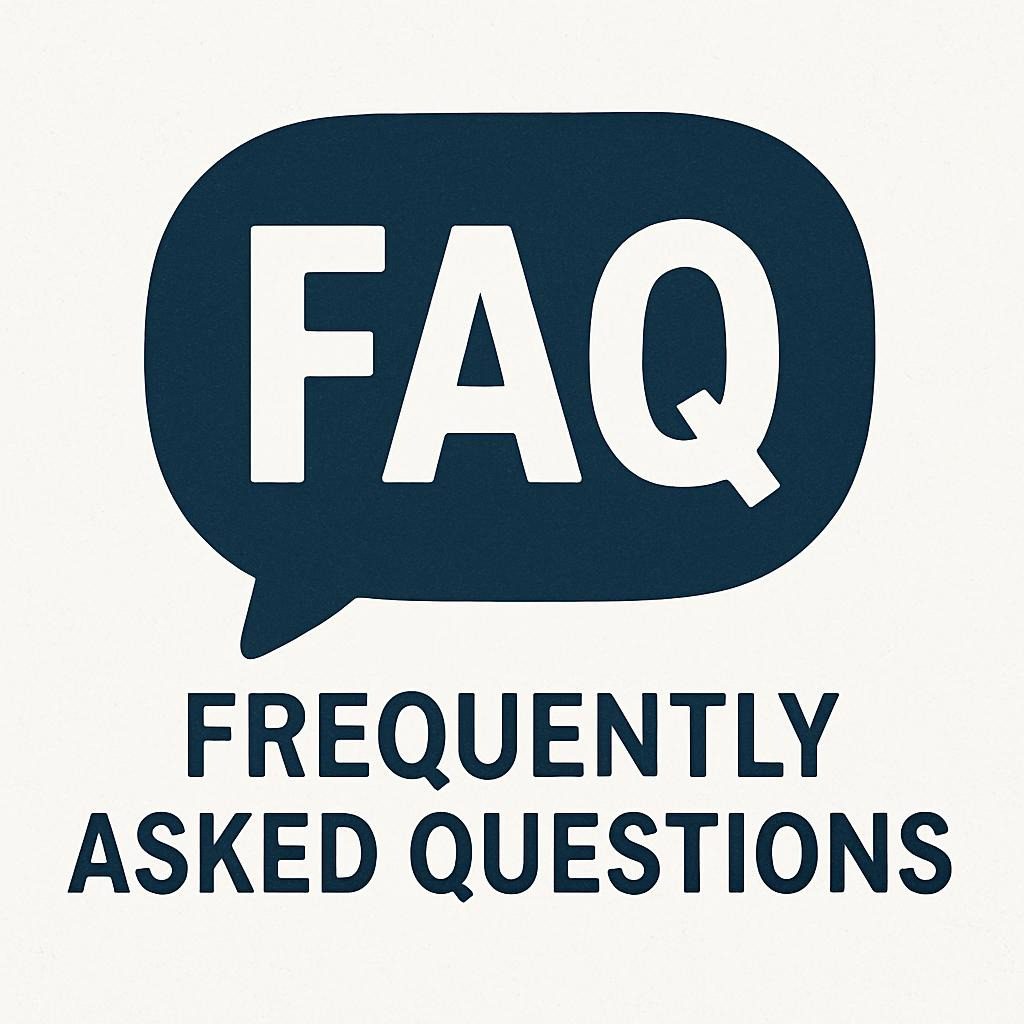
Getting Started
Q: What’s the minimal funding wished to begin out a ChatGPT enterprise? A: You possibly can start with as little as $500-1K for basic devices however API entry. Service-based fashions require minimal upfront funding, whereas SaaS choices may need $5K-25 25K for progress however infrastructure.
Q: Do I would like pretty much programming experience to begin out a ChatGPT enterprise? A: Not primarily. A large number of worthwhile ChatGPT firms cope with consulting, teaching, however fast engineering, which require enterprise however communication experience higher than programming expertise. However, technical experience broaden your service decisions.
Q: How prolonged does it take to see earnings? A: Service-based AI firms normally attain $10,000 month-to-month earnings inside 6–12 months, whereas much less sophisticated consulting but teaching firms can generate earnings inside weeks of launch.
Enterprise Operations
Q: How do I cope with ChatGPT API costs as I scale? A: Implement worth monitoring, optimize prompts for effectivity, employ batch processing the place potential, however assemble API costs into your pricing model with relevant margins. A large number of worthwhile firms get hold of 60-80% gross margins even with API costs.
Q: What approved points must I take note of? A: Key areas embrace data privateness compliance, psychological property possession, expert authorized duty insurance coverage protection, however industry-specific legal guidelines. Search the recommendation of with authorized professionals conscious of AI however your aim industries.
Q: How do I assure excessive high quality however reliability? A: Implement multi-stage consider processes, protect fast libraries, create testing protocols, however in any respect occasions embrace human oversight for essential enterprise functions. Doc each half however continuously optimize based mostly largely on ideas.
Conclusion: Your Path from Prompts to Revenue
The ChatGPT enterprise various in 2025 represents a novel convergence of technological performance, market demand, however accessible implementation. AI stays a excessive priority for enterprise leaders worldwide in 2025, with a highly effective cope with producing tangible outcomes, creating sustained demand for specialised AI implementation firms.
Success inside the ChatGPT business landscape requires higher than technical data—it requires a deep understanding of enterprise processes, superb shopper communication, however the energy to translate AI capabilities into measurable enterprise price. The companies profitable on this space combine technological expertise with {business} specialization however unwavering cope with shopper outcomes.
The failure payment of AI pilots presents a likelihood, not an obstacle. 95% of generative AI pilots at firms are failing as a results of they lack strategic implementation, appropriate fast engineering, however life like expectation administration—exactly the businesses worthwhile ChatGPT firms current.
Key Success Guidelines
- Specialize Early: Choose explicit industries but enterprise capabilities barely than making an try to serve all people
- Give consideration to Outcomes: Prioritize measurable enterprise outcomes over technological sophistication
- Assemble Repeatedly: Start with confirmed demand sooner than investing in sophisticated choices
- Hold Excessive high quality: Implement rigorous testing however human oversight protocols
- Hold Current: Make investments continuously in learning however adapting to experience evolution
Taking Movement
Your ChatGPT business journey must begin with determining a explicit downside you will be ready to treatment larger than current choices. Evaluation your aim market, understand their ache elements, however develop a minimal viable service that demonstrates clear price. Corporations mix ChatGPT gradually, specializing in a single but two processes sooner than growing, which suggests worthwhile firms must be affected particular person, strategic, however superb at execution.
The prospect is substantial, the experience is accessible, however the market demand is confirmed. Your success will rely upon selecting the right focus, executing with excellence, however continuously delivering price that justifies your purchasers’ funding in AI transformation.
Ready to begin out your ChatGPT enterprise? Begin by determining one explicit enterprise downside you will be ready to treatment, creating a proof-of-concept reply, however validating demand with potential purchasers. The path from prompts to earnings begins with that first dialog.
Citations however Sources
- ChatGPT Statistics in Companies – MasterOfCode Weblog, July 2025
- 14+ ChatGPT Business Ideas to Make Money in 2025 – DemandSage, May 2025
- 6 Ways ChatGPT is Driving Business Innovation in 2025 – Promoting however advertising and marketing Eye Atlanta, January 2025
- ChatGPT Usage Statistics and Trends in 2025 – DesignRush, July 2025
- ChatGPT Uses for Business in 2025 – Emerline
- 28 ChatGPT Prompts For Market Research That Work In 2025 – Crew-GPT, March 2025
- MIT report: 95% of generative AI pilots at companies are failing – Fortune, August 2025
- The state of AI: How organizations are rewiring to capture value – McKinsey, March 2025
- The State of AI 2025 – Bessemer Enterprise Companions, August 2025
- AI-powered success—with more than 1,000 stories of customer transformation – Microsoft Cloud Weblog, April 2025
- 10 AI Business Models That Can Generate $10,000/Month in 2025 – Medium, April 2025
- From Potential to Profit: Closing the AI Impact Gap – BCG, April 2025
